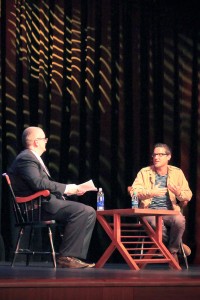Director of ‘Kony 2012’ discusses his campaign
USC Program Board Speakers Committee hosted Jason Russell, co-founder and chief creative officer of Invisible Children as well as the director of the viral documentary Kony 2012, paid a visit to USC Tuesday night to discuss the role of social media and how to utilize it for social change.

No boundaries · Alumnus and co-founder of Invisible Children Jason Russell speaks about the power of social media on Tuesday evening. – Uracha Chaiyapinunt | Daily Trojan
Russell, a USC alumnus, was propelled to fame through the viral video Kony 2012, which was uploaded online and eventually amassed more than 98 million views on YouTube. Kony 2012 focused on exposing the crimes of Joseph Kony, the leader of the Lord’s Resistance Army in Uganda.
Throughout the event, Russell discussed his continuing work with Invisible Children, as well as with the Kony 2012 campaign. Russell believed the video became so popular in a short time because of the variety of storytelling characteristics utilized in the documentary.
“I think that it was because it had heart, and it had humanity, and it had humor, it had heartbreak, it had horror,” Russell told the Daily Trojan. “So it had all these elements of what makes a powerful story: You had a very clear villain, the villain seen through a young 4-year-old’s eyes.”
Russell also discussed the reactions he and his team had once they realized how much attention their documentary was garnering.
“Our goal for the whole year was 500,000 views,” Russell told the Daily Trojan. “But I told the team, ‘Come on, let’s dream big and try for 3 million views,’ and we had 500,000 views within 12 hours and, I believe, 3 million views within the first 72 hours.”
Russell also addressed the criticisms that the Kony 2012 campaign drew after their video became famous, and what he learned from that experience.
“For me, it was that you really can’t control the media — a lot of things are said but there’s not a lot of accountability. So you don’t really know who to trust and there were landmines at every level of as far as what is the truth,” Russell told the Daily Trojan. “Even today, there are still so many millions of people who think Kony is dead, that Invisible Children is a scam, that we don’t put the money towards our initiatives, so I felt like my breakdown and all of that had to do with me trying to control what the media was putting out.”
Russell did not hesitant to joke about his minor scandal back in October 2012, when he was arrested for public indecency.
“After my breakdown I felt like I had two options. One was to hide, and the other option was to go out and say, ‘Yeah, I was butt-naked crazy in the street, I really was. I’m sorry if that offended you or hurt you. I’m sorry if you got made fun of at your school for defending Kony 2012 and Invisible Children and then your leader goes and loses his mind,’” Russell said. “I think, as cheesy as it sounds, I was reminded of USC’s ‘fight on’ [slogan] … that’s just kind of who I am.”
Many students who attended the event were impressed with how candidly Russell discussed his scandal.
“I think he did a really good job tackling [the controversies],” said Susana Heilbron Allara, a freshman majoring in global health. “I really liked his honesty.”
Several audience members agreed that coming to the event had changed their initial perceptions of Russell as a person from when they first heard about the Kony controversy.
“At first, I was very enthralled by [the documentary] and very interested in it,” said Sophie Ipsen, a sophomore majoring in international relations. “But then when all the controversies came out, I was a bit skeptical about what exactly was going on and I did kind of think twice about some of the stuff. Seeing this talk with him today really clarified a lot of things. It really showed me the nature of the movement is very genuine.”
Follow us on Twitter @dailytrojan
